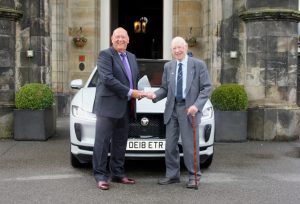… 2018 Jim Clark Memorial awrd for Ian Scott Watson …
Sixty-two years almost to the day after launching the career of Scotland’s greatest racing driver, Ian Scott Watson (born 1930) has been recognised by the Association of Scottish Motoring Writers. At a ceremony in Mar Hall recalling Clark’s early exploits with a D-type Jaguar, he was presented with the Association’s annual Jim Clark Memorial Award which, “Acknowledges and rewards the outstanding contribution of a Scot or Scots for services to motoring and/or motor sport.”

ASMW President John Murdoch with Ian Scott Watson
Jim Clark was launched on his way to two world championships and a record series of Grand Prix victories at Crimond, Aberdeenshire on 26 June 1956. Convinced of his friend’s talent Scott Watson persuaded him to take part in a race run by the Aberdeen and District Motor Club. Their 250mile drive from the Borders to the windswept disused airfield eight miles from Fraserborough took five hours. There was no Forth road bridge or motorway in 1956.
Scott Watson thought the DKW a likely winner in Scottish rallies against Renault 760s, Standard 10s, Morris Minors, and Austin A30s. The ‘Sonderklasse’ with a 3-cylinder 2-stroke engine and front wheel drive was an eccentric choice for sprints, and gymkhanas. Now he entered it in a sports car and handicap saloon car races with Clark as “reserve driver”.
To his own surprise Clark was 3 seconds a lap quicker than the owner in practice. The organisers suspected Scott Watson of driving slowly to get a better handicap in the saloon race. He wasn’t. He really was 3 seconds a lap slower. But the pair thought they were far enough from the Borders family they knew would disapprove of Clark racing. He had taken on responsibilities on the family farm and they didn’t want him doing anything that would require time off.
Clark took a lot of motivating. He did not realise how good he was. Scott Watson spent years, providing him with expensive cars including a Porsche and a Lotus Elite: “I may not have been a judge of what was required to make a grand prix driver, but I could tell from the way Jimmy drove both on the road and on the track that he was exceptionally quick. On the road he was amazing, perfect to sit beside. His driving was smooth, and his anticipation marvellous. You could feel him ease off the throttle and then spot a car he had already seen approach on a distant side road. It was difficult to know why he did not feel confident about his own ability. He chewed his fingers even then. He lacked confidence, yet when he got on the track it was totally forgotten. He gave it everything and drove superbly.”
Scott Watson’s motives were altruistic. He loved motor racing and once Clark’s ability emerged saw himself in the role of promoter. He was first to provide a car, took every initiative in advancing Clark’s career and effectively organised his exploits with the Border Reivers’ D-type Jaguar. His first race at Full Sutton earned a place in the record books as the first sports car driver to lap a British circuit at over 100mph.
Yet it was not plain sailing. Having accompanied Clark, in effect running his business affairs when he was taken on as a Grand Prix driver by Lotus, Scott Watson was asked to take a back seat. He wrote later that being forbidden to act as Jim’s manager was a blow. “I thought I might have had a small managerial percentage of his winnings and recoup some of my large personal outlay. Later Jim did leave me a small bequest in his will, which I appreciated.”
Sir Jackie Stewart describes Clark as, “… the best driver I ever raced with and against”. Three times Le Mans winner Allan McNish: “A modern driver winning the British Grand Prix, racing in Formula 2, then at Indianapolis would be unthinkable.” David Coulthard: “Jim’s achievements and Jackie Stewart’s input were fundamental to me becoming a professional racing driver.” Dario Franchitti: “He was my hero”. The four patrons of the Jim Clark Trust wrote Forewords to the new edition of Eric Dymock’s life of Jim Clark. Updated and redesigned, it celebrates the life and achievements of Jim Clark (1936-1968) and a royalty on every copy goes to the Jim Clark Trust.
Jim Clark rewrote the annals of American racing at Indianapolis, second at his first attempt in 1963, winning in 1965. He narrowly missed four consecutive world titles. Misfortune in the closing laps of the final race of the season twice denied him a unique quartet. Some of his other records remain secure however. His eight “grand slams” (pole position, leading every lap, fastest lap and winning a Grand Prix – his closest rivals Alberto Ascari and Michael Schumacher managed only five) is unlikely to be broken. He seemed a match for any odds during eight dangerous years at the top of motor racing, yet died in an unlikely accident at a minor event at Hockenheim on April 7 1968. Genius at the wheel was not enough. Rivals’ subsequent safety campaigns saved countless lives on and off the track.
by Eric Dymock, Sat 9th June 2018